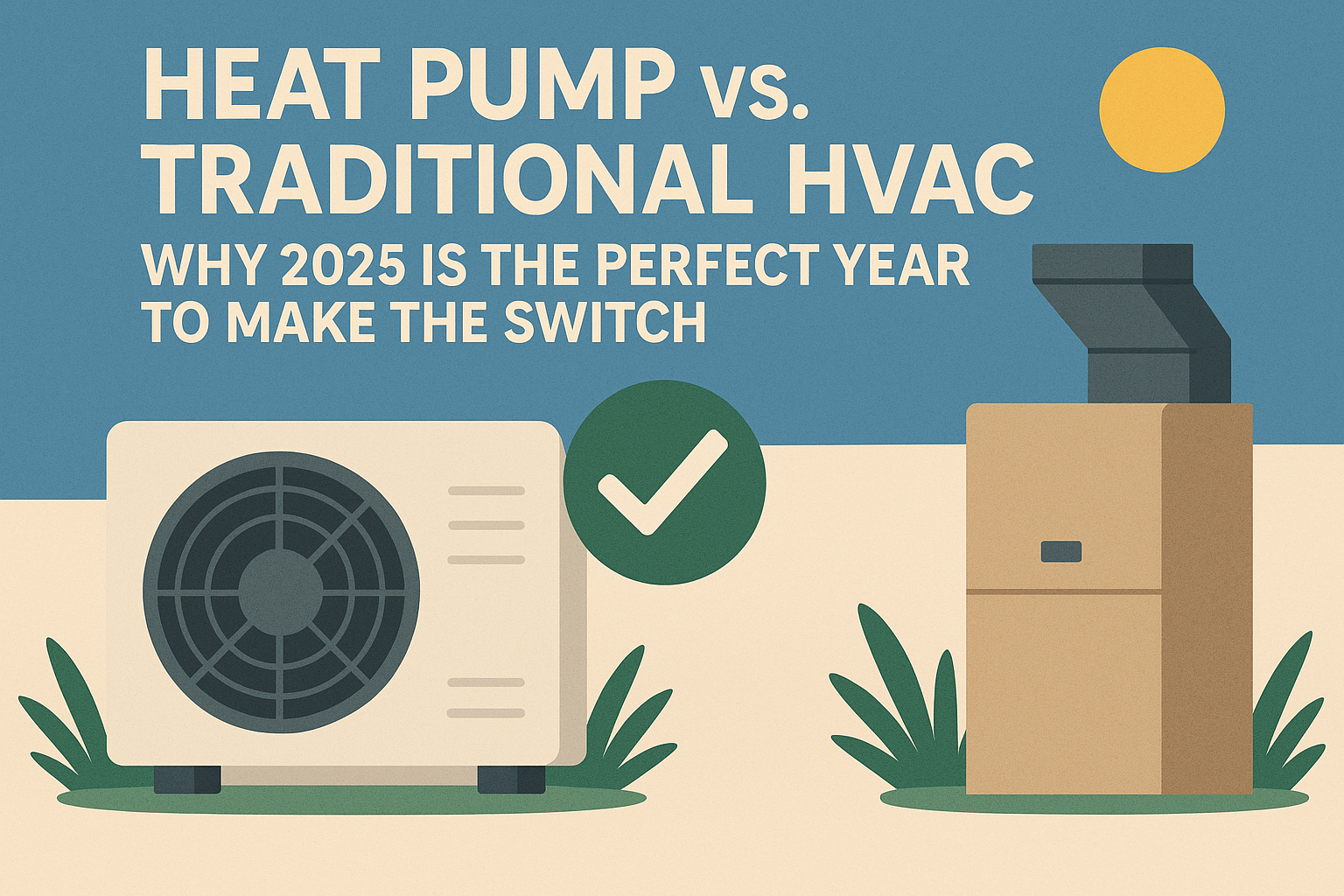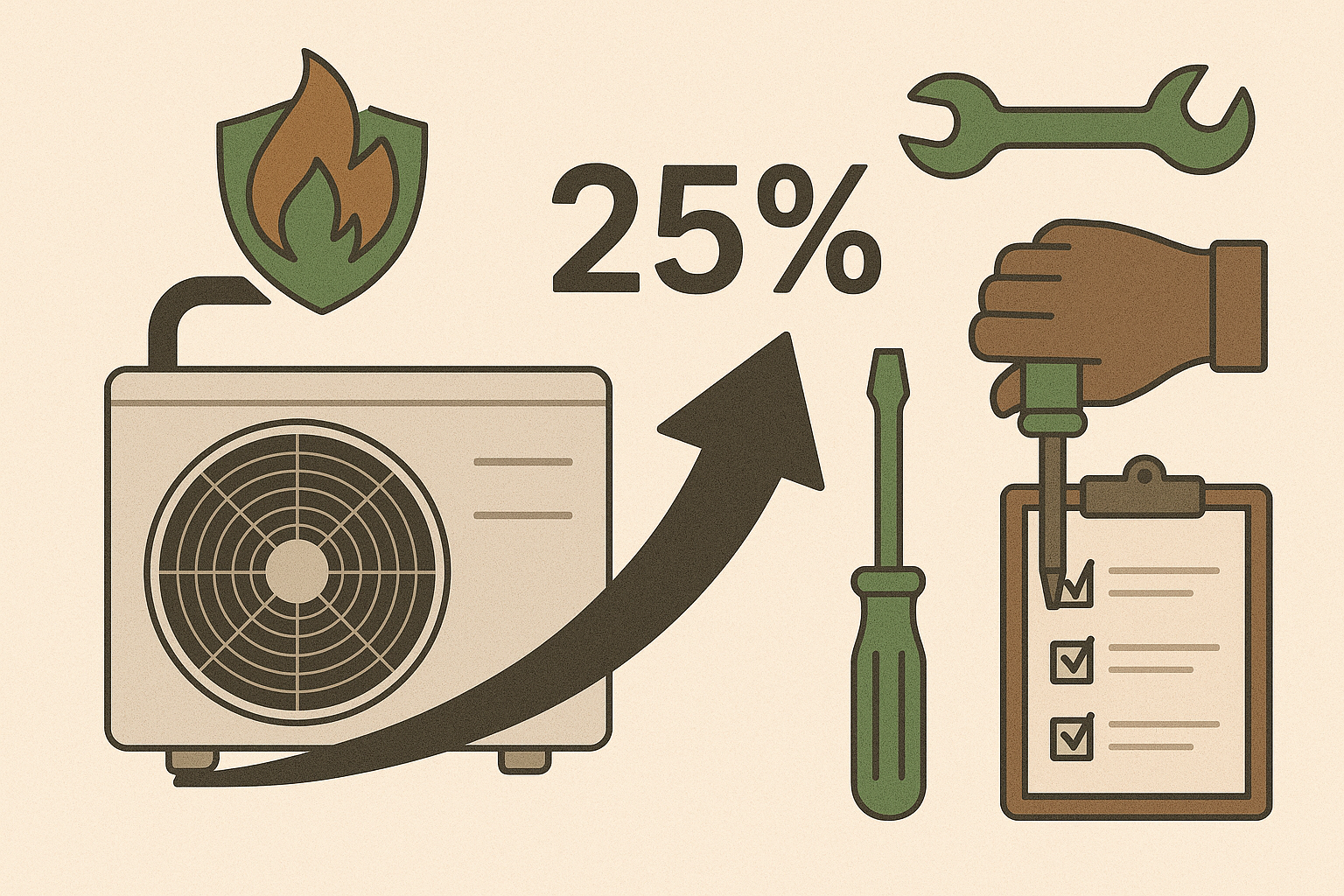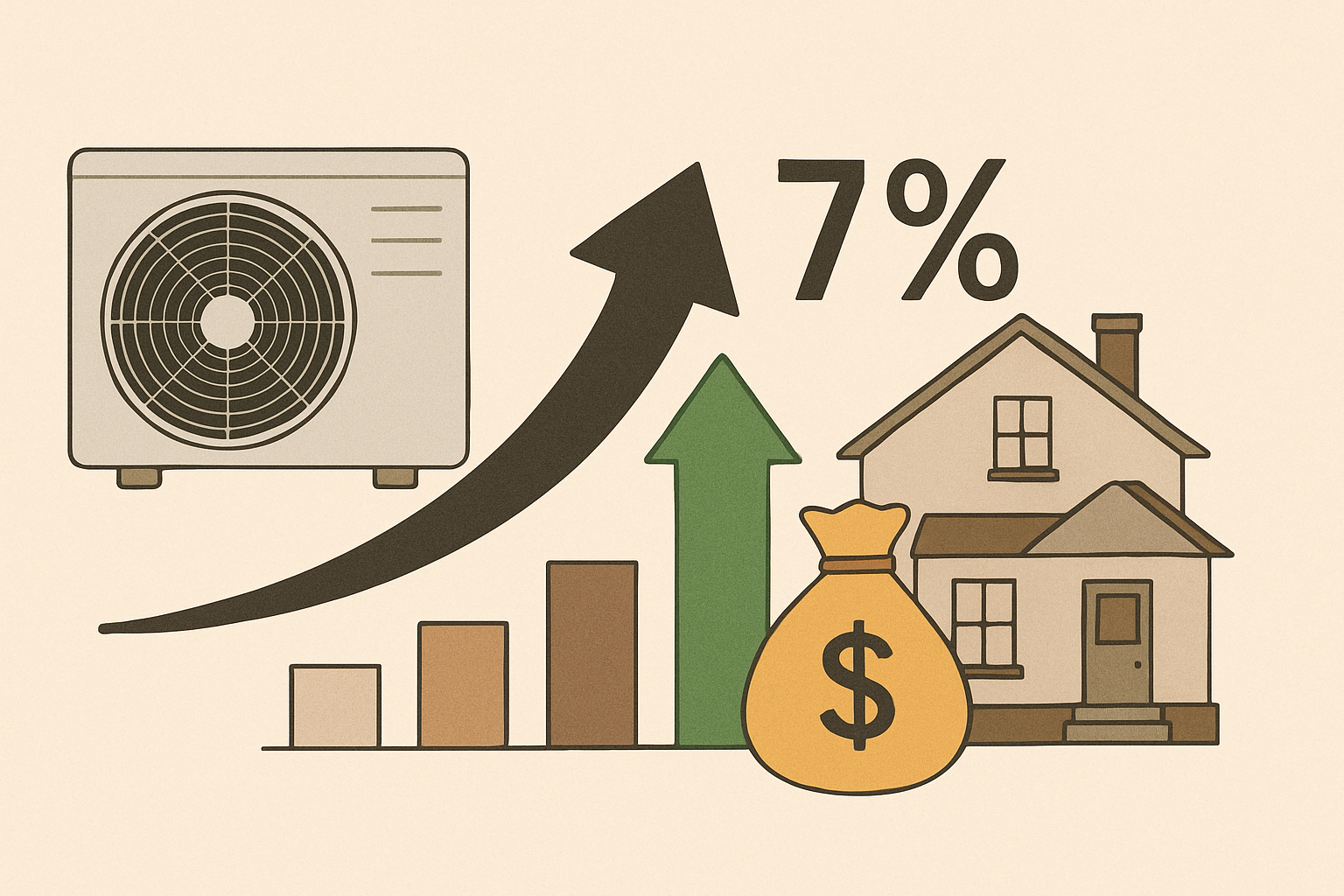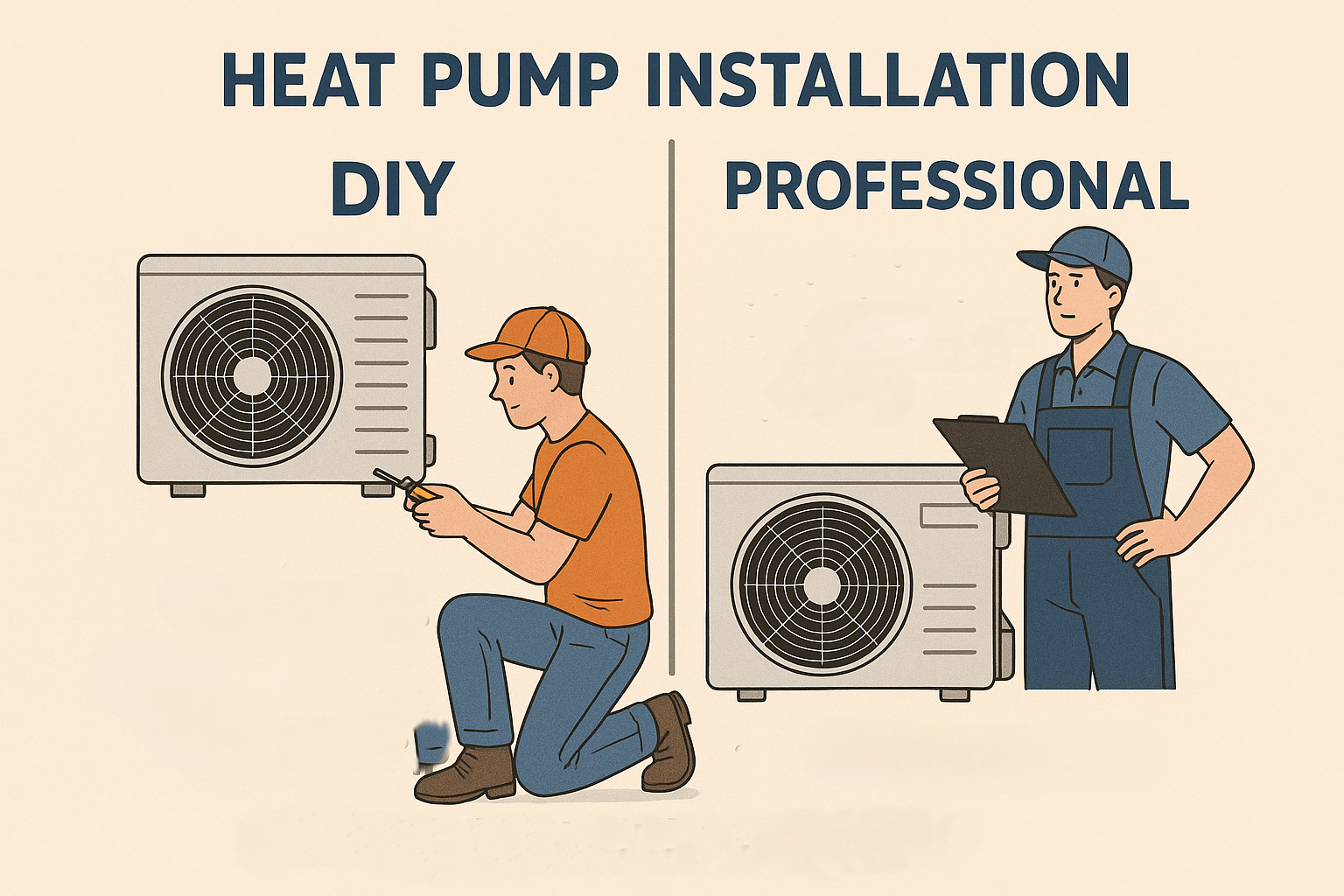Heat Pump vs. Traditional HVAC: Why 2025 Is the Perfect Year to Make the Switch
Are you considering upgrading your home's heating and cooling system in 2025? With rising energy costs, increased focus on environmental impact, and generous government incentives, this year presents an ideal opportunity to evaluate whether a heat pump or traditional HVAC system is right for your home. This comprehensive guide will help you understand the key differences, benefits, and considerations for both options.
Understanding Heat Pumps vs. Traditional HVAC Systems
Before diving into comparisons, let's clarify what each system actually is and how they work.
What Is a Heat Pump?
A heat pump is an all-in-one heating and cooling system that works by transferring heat rather than generating it. During winter, it extracts heat from the outdoor air (even cold air contains heat energy) and moves it inside your home. In summer, it reverses the process, removing heat from your home and releasing it outside—just like an air conditioner.
Heat pumps consist of:
- An outdoor unit containing the compressor and condenser coil
- An indoor air handler with an evaporator coil
- Refrigerant lines connecting the two components
- A reversing valve that changes the direction of refrigerant flow
What Is a Traditional HVAC System?
A traditional HVAC (Heating, Ventilation, and Air Conditioning) system typically consists of separate heating and cooling components:
- An air conditioner that cools your home in summer
- A furnace (gas, oil, or electric) that heats your home in winter
- Ductwork that distributes conditioned air throughout your home
Unlike heat pumps, traditional systems generate heat through combustion (gas/oil furnaces) or electric resistance, rather than transferring existing heat energy.
Energy Efficiency Comparison
One of the most compelling reasons to consider a heat pump in 2025 is the significant difference in energy efficiency.
Heat Pump Efficiency
- Heat pumps can be up to 3X more energy efficient than furnaces
- According to the U.S. Department of Energy, heat pumps can reduce electricity use for heating by about 50% compared to electric furnaces or baseboard heaters
- Heat pumps generally dehumidify air better than standard AC units, resulting in less energy use
- Modern cold climate heat pumps maintain high efficiency even in freezing temperatures
Traditional HVAC Efficiency
- Gas furnaces burn fossil fuels directly, creating more carbon emissions
- Even high-efficiency furnaces can't match the efficiency of heat pumps for heating
- Traditional air conditioners are comparable to heat pumps in cooling efficiency, but the combined system is less efficient overall
Real-World Impact
For the average homeowner, switching from a traditional HVAC system to a heat pump can result in energy savings of 30-40% annually. This translates to lower utility bills and a reduced carbon footprint.
Cost Considerations
When evaluating heat pumps versus traditional HVAC systems, it's important to consider both upfront and long-term costs.
Installation Costs
Heat Pump Installation:
- Average cost: $4,200 to $7,900 (equipment and labor)
- Higher-end models and complex installations may cost more
- Ductless mini-split systems have different price points than ducted systems
Traditional HVAC Installation:
- Central air conditioning: $3,900 to $7,900
- Furnace: $1,700 to $10,000
- Combined system: $5,600 to $17,900
While heat pumps typically have a higher initial cost than either an air conditioner or furnace alone, they're often more economical than purchasing both components of a traditional system.
Long-Term Operating Costs
The true cost comparison becomes clearer when considering long-term expenses:
- Heat pumps typically provide significant energy savings over time
- Maintenance costs are comparable between both systems
- Heat pumps eliminate the need for natural gas service in all-electric homes
- Utility rates (electricity vs. natural gas) in your area will impact actual savings
2025 Financial Incentives
What makes 2025 particularly advantageous for heat pump adoption are the substantial financial incentives available:
- Federal tax credits up to $2,000 for qualifying heat pumps (30% of cost)
- Only $600 tax credit for qualifying air conditioners or furnaces
- Additional state and utility rebates may be available
- Some rebate programs offer up to $8,000 for low and moderate-income households
These incentives can significantly reduce the upfront cost difference between heat pumps and traditional systems.
Climate Considerations
Your local climate plays a crucial role in determining which system is best for your home.
Heat Pumps and Climate
- Heat pumps work most efficiently in moderate climates
- Modern cold climate heat pumps can operate effectively down to -13°F or lower
- In extremely cold regions, a dual-fuel system (heat pump with gas furnace backup) might be optimal
- Heat pumps excel in regions with hot summers and mild winters
Traditional HVAC and Climate
- Gas furnaces can produce very high heat output even in extreme cold
- Traditional air conditioners perform similarly to heat pumps in cooling mode
- In regions with very mild winters, the heating capabilities of a heat pump may be more than sufficient
Environmental Impact
For environmentally conscious homeowners, the difference between these systems is substantial.
Heat Pump Environmental Benefits
- Heat pumps are electric and don't involve direct burning of fossil fuels
- They can be powered by renewable energy sources like solar panels
- Switching from gas heating to a heat pump can reduce a home's carbon emissions by 1-3 tons annually
- Modern refrigerants have lower global warming potential than older types
Traditional HVAC Environmental Considerations
- Gas furnaces produce carbon dioxide and other emissions directly in your home
- Older air conditioners may use refrigerants with higher environmental impact
- Fossil fuel extraction and transportation add to the overall environmental footprint
Lifespan and Durability
When investing in a home comfort system, longevity matters.
Heat Pump Lifespan
- Average heat pump lifespan: 15 years
- Heat pumps operate year-round, which can affect longevity
- Regular maintenance can extend lifespan significantly
Traditional HVAC Lifespan
- Average air conditioner lifespan: 15 years (potentially longer since it only runs in summer)
- Average gas furnace lifespan: 15-20 years
- Combined system may have staggered replacement schedules
Comfort and Performance
Beyond efficiency and cost, comfort is a primary consideration for most homeowners.
Heat Pump Comfort Features
- Provides more consistent temperatures throughout the home
- Better humidity control in many cases
- No combustion means no risk of carbon monoxide
- Modern variable-speed heat pumps adjust output to maintain precise comfort levels
Traditional HVAC Comfort Considerations
- Gas furnaces can produce very high heat quickly
- May create more temperature fluctuations
- Requires carbon monoxide detectors for safety
- May create drier indoor air during heating season
Dual-Fuel Systems: The Best of Both Worlds?
For homeowners in colder climates who are interested in heat pump technology but concerned about extreme weather performance, a dual-fuel system offers a compelling compromise.
How Dual-Fuel Systems Work
- Combines an electric heat pump with a gas furnace
- Heat pump operates in moderate temperatures for efficiency
- Gas furnace provides supplemental heat in extreme cold
- System automatically chooses most efficient heating method based on outdoor temperature
Benefits of Dual-Fuel Systems
- Maximum efficiency across all weather conditions
- Reduced reliance on fossil fuels
- Lower operating costs than a traditional system
- More comfortable than either system alone in variable climates
Making the Right Decision for Your Home
With all these factors in mind, how do you decide which system is right for your home in 2025?
Consider a Heat Pump If:
- You live in a moderate climate or a region with mild winters
- You're environmentally conscious and want to reduce your carbon footprint
- You want to take advantage of substantial tax credits and rebates
- You're looking to simplify with one system for both heating and cooling
- Your home has good insulation and is relatively energy efficient
- You have or plan to install solar panels
Consider a Traditional HVAC System If:
- You live in an extremely cold climate where heat pumps might struggle
- Natural gas is significantly cheaper than electricity in your area
- Your home has poor insulation that would make a heat pump work harder
- You're on a tight budget and can only replace one component now
- Local contractors have limited experience with heat pump technology
Consider a Dual-Fuel System If:
- You experience both extreme cold and hot weather
- You want to reduce fossil fuel use but need reliable heating in very cold temperatures
- You're willing to invest more upfront for long-term efficiency
- You want the most flexible system for varying conditions
Conclusion
As we move through 2025, the case for heat pumps grows stronger with improved technology, greater efficiency, and substantial financial incentives. While traditional HVAC systems remain viable options in certain scenarios, heat pumps offer a forward-looking solution that aligns with both economic and environmental goals.
The perfect time to make the switch to a heat pump may be when your current heating or cooling system needs replacement. With federal tax credits available until 2032, you have time to plan, but the sooner you upgrade, the sooner you'll begin enjoying the benefits of lower energy bills and reduced environmental impact.
Before making your final decision, consult with multiple HVAC professionals who are experienced with both types of systems. They can provide personalized recommendations based on your home's specific needs, your local climate, and your budget considerations.
FAQs About Heat Pumps vs. Traditional HVAC
Q: Will a heat pump work in my cold climate? A: Modern cold climate heat pumps can operate efficiently down to -13°F or lower. For extremely cold regions, a dual-fuel system with backup heating may be recommended.
Q: How much can I save by switching to a heat pump? A: Energy savings typically range from 30-40% compared to traditional systems, but actual savings depend on your local climate, utility rates, and current system efficiency.
Q: Do heat pumps provide enough heat to keep my home comfortable? A: Yes, properly sized heat pumps can maintain comfortable temperatures in most homes. The key is professional sizing and installation.
Q: What maintenance does a heat pump require? A: Heat pumps require similar maintenance to traditional systems: regular filter changes, annual professional service, and keeping the outdoor unit clear of debris.
Q: Can I install a heat pump if I don't have ductwork? A: Absolutely! Ductless mini-split heat pumps are perfect for homes without existing ductwork and can be installed with minimal disruption.
Q: How do the tax credits work for heat pumps vs. traditional HVAC? A: In 2025, qualifying heat pumps are eligible for a tax credit of 30% of costs up to $2,000, while traditional HVAC components are limited to $600 credits.
This article is for informational purposes only and does not constitute professional advice. Consult with qualified HVAC professionals regarding your specific circumstances.



